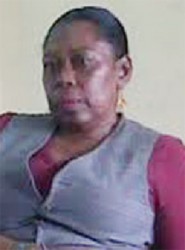University of Guyana Senior Staff Association (UGSSA) President Patsy Francis says the union will support the proposed increase in tuition fees only if it is accompanied by an at least 60% increase in the staff’s wages and salaries in the first year.
She also says the workers’ unions would like to see improvement in the UG infrastructure and that they will work to help improve the university’s services.
“The money must not trickle down, but must drop down to us,” she declared during a presentation made before an almost packed audience of academic and support staff during the first round of consultations between the university’s administrators and this group of stakeholders yesterday morning.

Dean of the Faculty of Social Sciences Dr Paloma Mohammed, during a separate presentation, highlighted the disparity between what a Distin-guished Professor at the university takes home—less than US$2,000 (roughly $420,000) per month—while assistant lecturers make—around US$600 ($126,000) per month. She also bemoaned that some support staff, those whom University of Guyana Workers Union (UGWU) head Bruce Haynes says do the work no one else will, make less than US$200 ($42,000) per month. As Mohammed read the last figure, one staff member was overheard saying, “she talking ’bout me salary right deh bai.”
During the consultation, UG Vice Chancellor (VC) Jacob Opadeyi promised that if the staff accepts the proposal for a tuition increase, the added revenue would go a far way towards improving the university’s infrastructure. Following the consultation, he told Stabroek News that while talks and plans to adjust fees have gained traction, the adjustment is not a done deal. The University’s Council has also endorsed the increase, he continued, but it is not imminent.
Opadeyi explained that the consultation process is one of the final aspects, and probably the most important part of the process. The fees will only be increased, he has said, if the proposal receives positive responses from the stakeholders being engaged throughout this week.
Francis has pledged the support of those the unions represent but only as long as the initiative facilitates the increase of wages and salaries by no less than 60% in the first year of the increase. She also noted the need for the added money to go towards improving infrastructure, and has promised Opadeyi that staff members will work assiduously towards the realisation of his ambitions.
Francis too agrees that facilities need to be improved, and alluded to the fact that students and staff members using the Stables, in particular, are usually terrorised by mosquitoes at night.
Another observation on UG’s facilities was made by Carlton James, moderator of the consultations. He said that by the looks of the furniture in the George Walcott Lecture Theatre (GWLT), in which the consultations are being held, they have been “exceedingly used.” He also said that from what he has heard the cries of the staff are likely to be heard and taken into consideration.
Meanwhile, Haynes argued that the support staffers, who kept the university alive, are not being valued. “This is a shame,” he said to staff members as well the members of the university’s administration.
Haynes lamented that obligations to staff and students are not being met and suggested that this is affecting the university’s ability to meet its obligations to the nation. He added that an increase in revenue is needed to bridge the gap but said the students, unfortunately, through the increase of their fees, will have to help facilitate the increase.
Opadeyi is proposing that UG’s tuition fees be adjusted, pursuant to a 1994 decision, to account for inflation. In 1994, a decision was taken setting tuition fees at US$1,000 per year. At the time the decision was made, the exchange rate was US$127 to $1, which put the tuition at $127,000 per year. Since this time there has been significant inflation and the exchange rate is now more or less US$210 to $1. This will put the revised tuition fees at around $210,000 per year.
The University’s Council decided since 2012 to make the adjustment but the decision was not acted upon.
UG’s Bursar, Holda Poonai, explained to the staff that in addition to the unadjusted fees the university has seen its enrollment figures stagnate and dip considerably. As a result, she said, UG’s expenditures far outweigh its revenue. This has been the case for several years now, she noted.




